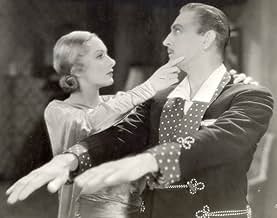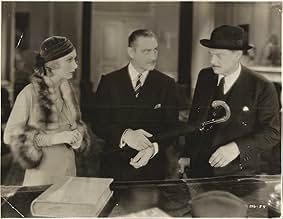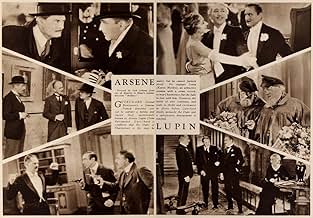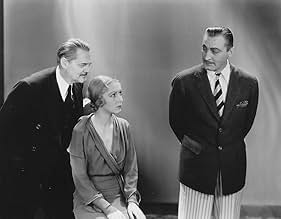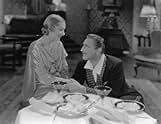A detective is tasked to capture an elusive thief called Arsene Lupin.A detective is tasked to capture an elusive thief called Arsene Lupin.A detective is tasked to capture an elusive thief called Arsene Lupin.
- Awards
- 3 wins total
- Laurent
- (as James Mack)
- Louvre Tour Guide
- (uncredited)
- Party Guest
- (uncredited)
- Louvre Guard
- (uncredited)
- Party Guest
- (uncredited)
- Gendarme
- (uncredited)
- Mother at the Louvre
- (uncredited)
- Party Guest
- (uncredited)
- Detective
- (uncredited)
Featured reviews
ARSENE LUPIN (Jack Conway, 1932) ***
However, the film under review – which I had first acquired via a TV-to- VHS-to-DVD conversion of poor quality, but which I eventually upgraded (albeit still culled from a TCM screening) – remains perhaps the most popular rendition of this debonair figure; by the way, I also have in my collection its direct but-as-yet unwatched 1938 sequel ARSENE LUPIN RETURNS. Incidentally, such gentlemen crooks were a regular feature of pulp fiction (notably the similarly much-filmed "Raffles": I own versions of it dating from 1917 – starring, as here, John Barrymore – 1925, 1930 – alas, only a TV-to-VHS copy – and 1939!) until they made way for more ruthless and ambitious criminal masterminds such as Fantomas and Dr. Mabuse.
Anyway, this classy production – best-known for first teaming John with his elder brother Lionel (they would appear together 5 times in 2 years, on one of which they were even joined by sister Ethel!) – is most enjoyable, with a plot which has since become a cliché: the protagonist's duality (hiding under an air of respectability and, at one point, the guise of an aged flower-seller to pull off a daring 'job' at the Louvre); the analogous deception by the woman in his life (or, more precisely, the one he finds in his bed – a delightfully racy scene for an MGM picture but, then, this was a "Pre-Code" release – during a reception!); Lupin's tenacious, but ultimately sympathetic, antagonist (whose physical attributes – including a prominent limp – actually fit the description of the 'villain' as given by an eye-witness!); the ultra-modern gadgets (a safe without the proverbial combination but 'armed' with an electrical charge), etc.
John Barrymore's famed good looks ("The Great Profile" was 50 at the time) and up-till-then infrequently-tapped comic timing (though he would increasingly come to rely upon it for the rest of his career!) make him, respectively, ideal casting and a pleasure to watch; for what it is worth, I have as many as 23 titles of his still to go through even if only 4 fall into my current exercise of movie viewing based on all-time best polls and the higher ratings bestowed by Leslie Halliwell and Leonard Maltin!
The Barrymores in a delightful French farce
Arsene Lupin seems to enjoy making a fool out of the authorities and out of Guerchard in particular just as much as he enjoys the thrill of stealing and also the high life. When Guerchard paroles a particularly charming thief, Sonia (Karen Morley), so she can show up naked in Lupin's bed unexpected and charm Lupin into revealing something, Lupin simply charms her and gets her to fall in love with him so that her loyalties shift.
Guerchard has a month until he's eligible for his pension, but his superior states that if Lupin is not caught in a week, he'll be discharged and thus not get his pension. Complications ensue.
The Barrymore brothers were great in this film, and the ending was unexpected. I will say I would doubt the authenticity of the denouement if there were any other two actors involved. They made it work.
Great Fun for the Barrymore Brothers
*** (out of 4)
When John Barrymore got out of his contract with Warner, MGM wasted no time in signing him and even lesser time in putting him in a film with his brother Lionel. This was the first of five films they'd make together and their easy to spot rivalry really makes this film the charming gem that it is. An elderly detective (Lionel) is convinced that the Duke of Charmerace (John) is the infamous jewel thief known as Arsene Lupin. The detective will stop at nothing to prove his thoughts and that includes bringing in a sexy spy (Karen Morley). The story itself isn't anything ground breaking or Oscar-worthy but it is good enough to build up two nice characters and then stand back and let the actors do all the work. Fans of the brothers will certainly get a kick out of seeing the two men working together as both deliver very strong performances and they really make this film worth seeking out. What works best is the comic timing that the two men bring to the table as well as their rivalry. Each scene that the two men are in you can tell that they are trying to out act the other and this adds a charm that no two other actors could have captured. Just take a look at the sequence at the start when Lionel arrests John thinking that he's lying about being the Duke. Just watch this scene and then compare it to a later scene where John is holding Lionel captive until he can prove that he's really a cop. Morley also fits into the threesome quite well as she has an undeniable sexual tension with John and some fun comic touches with Lionel. The scene where she introduces herself to the Duke while naked in his bed is a pre-code gem. Some could argue that a stronger "story" would have helped matters and it might have but the cast doesn't even bother to speak with French accents so there's no doubt that the studio was just trying to get the two men in the same film. The ending packs a terrific punch as everything gets closed up very tightly and in a way that everyone, including the viewer, wins.
Lionel out-hams brother John in old-fashioned jewel thief story...
KAREN MORLEY is the attractive blonde who is supposed to be helping Lionel get the goods on the thief--but, unfortunately, she's no help at all when she falls hopelessly in love with the charming scoundrel.
So much about the film, where much of the action takes place on a country estate with wealthy people in attendance, reminds me of the David Niven/Olivia de Havilland film about the Scotland Yard thief RAFFLES. Barrymore plays the role with the same effortless charm that Niven adapted for his Raffles, the man who kept authorities baffled with a string of jewel robberies.
TCM is showing a good print of the film and while some of the dialog leaves a lot to be desired, it's a good example of an early sound film that still holds up today. Interior sets of the country estate are expensively mounted and it's obvious this was designed as a major film, not a programmer, despite the slight story.
Lionel hams it up considerably throughout, but John is more effective in his underplayed role.
The operative word is fun. That's the only way to take an Arsene Lupin story, book or movie. This movie gets the right spirit.
Karen Morley did a filmed interview in 1992. You can find it on-line. Toward the end, the interviewer asked which of her films she liked doing the most. She was in some good ones, before her independent spirit got in her way and she broke her MGM contract: "Scarface:' "Mata Hari:' "Dinner at Eight;" "Black Fury;" "Our Daily Bread;" "Gabriel Over the White House;" later "Pride and Prejudice." I expected her to say "Scarface." She said "Arsene Lupin" because it was fun. She and Jack Barrymore, she said, had fun. You can see it on screen. They're all having fun. (Tully Marshall looks like he wants to laugh half the time.) The sleep-walking scene is hilarious. And the scene where she's naked in Barrymore's bed. A gem. Karen Morley had an unusual style, understated. She makes you want to get inside her head, since she won't make her emotions obvious on the surface. It is sometimes disconcerting. But it makes you watch her closely. She also said, perhaps jokingly, in the interview, "I wasn't very good, I think, (in that movie) but it was fun." I thought she was very good, and smart. You can't out-act John Barrymore when he wants to ham it up. So smile (she had a wonderful smile) and let him do his thing. Both Barrymores do their thing. They catch the spirit of Maurice LeBlanc's outrageous characters marvelously. My recommendation: have a beer or two, or a glass of Bordeaux, then settle in to watch this film. You'll have a perfect evening's entertainment.
Did you know
- TriviaThe selling point at the time of the film's release was the first joint screen appearance of brothers John and Lionel Barrymore. Their chemistry was so strong that they would be co-assigned four more times by MGM in the next two years, in Grand Hotel (1932), Rasputin and the Empress (1932), Night Flight (1933), and Dinner at Eight (1933), the last of which gave them no scenes together. Rasputin and the Empress (1932) marked the only time that all three Barrymore siblings - Lionel, Ethel and John - appeared in the same film.
- GoofsLupin steals the Mona Lisa by wrapping the canvas around his umbrella. The Mona Lisa is painted on a wood panel.
- Quotes
Arsène Lupin: [fetching Sonia's evening gown from the maid and holding it up to admire it] Well, here we are. It's very nice! It's a little naughty. It's very ni - Do you think your father the general would approve of this?
Sonia: My father the general always said that a gentleman was a man who never went to bed with his spurs on.
Arsène Lupin: Isn't that a pity. I'm so fond of horses. I could give up riding...?
Sonia: Give me that dress!
Arsène Lupin: You can't get into it alone
Sonia: The maid will help me.
Arsène Lupin: The maid? I know more about unhooking than any maid in Paris.
Sonia: Yes, but I want this one hooked.
[she reaches for the dress, which he holds out of reach]
Sonia: I'm going to stay right here in this bed until you leave this room!
[Chamerace walks over to the window and prepares to toss out the dress]
Sonia: What are you doing?
Arsène Lupin: Well, if you're going to stay in bed you won't need the dress.
- Crazy creditsThe opening title doesn't list the Barrymores separately, but instead as a pair, "John and Lionel Barrymore."
- ConnectionsFeatured in Biography: The Barrymores (2002)
Details
Box office
- Budget
- $433,000 (estimated)
- Runtime
- 1h 24m(84 min)
- Color
- Aspect ratio
- 1.37 : 1



